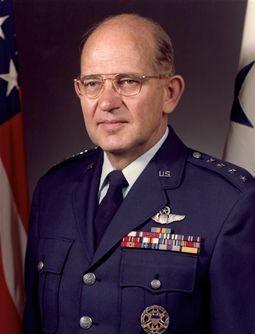
NEWSROOM
 |
NEWSROOM |
|
|
|
|
|||
|
By Mike Mitchell |
||||
 |
January 6, 2010 - General Lew Allen Jr., the 10th chief of staff of the
Air Force, passed away January 4, 2010, in
In 1952 he received a Master of Science degree in nuclear physics and
went on to earn a doctorate in physics in 1954. He spent the next 19
years working in the scientific community, involved with some of the
nation's most sensitive space projects. For that work he was inducted
into the Air Force Space and Missile Pioneers Hall of Fame Aug. 8, 2007,
at Peterson AFB,
During his tenure, he oversaw the establishment of Air Force Space
Command. Following his retirement in July 1982, he became director of
the Jet Propulsion Laboratory National Aeronautics and Space
Administration center in |
|||
| Gen. Lew Allen Jr., the 10th chief of staff of the Air Force, passed away Jan. 4 in Potomac Falls, Va. | ||||
|
An award has been established in his honor that is presented annually to
a base-level officer and senior NCO in aircraft, munitions or missile
maintenance directly involved in aircraft sortie generation. According
to officials, the award was established as a tribute to General Allen's
legacy of attention to detail and technical expertise, attributes
reflected in the nominees honored with the award bearing his name.
After completing multiengine flight training in November 1946, General
Allen was assigned to Strategic Air Command's 7th Bombardment Group at
Carswell Air Force Base,
In September 1950, he entered the |
||||
|
From June 1957 to December 1961, General Allen was assigned to Kirtland
Air Force Base,
He was assigned in December 1961, to the Office of the Secretary of
Defense, Space Technology Office in the Directorate of Research and
Engineering,
After serving briefly as chief of staff for Air Force Systems Command at
Andrews Air Force Base,
Allen served as the vice chief of staff, U.S. Air Force from April 1978
until he became Chief of Staff of the United States Air Force in July
1978. His nomination was unusual in that he had never served an overseas
or a combat assignment, and most of his positions were in highly
specialized activities rather than in the usual command structure of the
Air Force.
Following retirement from the Air Force in 1982, he became the Director
of Jet Propulsion Laboratory, during the Voyager program, serving in
that capacity until 1990. He is a member of the National Academy of
Engineering and the Council on Foreign Relations.
From 1993 to 1995, General Allen served as a member of the President's
Foreign Intelligence Advisory Board (PFIAB) and the Intelligence
Oversight Board. Allen was awarded the 1999 Distinguished Graduate Award
of the Association of Graduates, the alumni association of
The United States Air Force has created an award in his honor, the
General Lew Allen Jr. Trophy, awarded annually to an Officer and
Senior NCO in the aircraft maintenance or munitions career fields
directly involved with sortie generation.
|
| ?AvStop Online Magazine Contact Us Return To News |
|